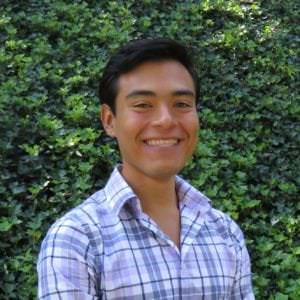In Pride, My Pentecost

Editor’s Note: Kevin Ruano shares his personal reflections, observing what Pentecost and Pride mean to him.
It is Saturday, June 8 – the day before the feast of Pentecost. My body is currently in Tulsa, Oklahoma where tomorrow I will share a glimpse of Franciscan lay mission with the community of St. Francis Xavier Catholic Church. My ambulant spirit is here but also in Washington DC. If I were physically there, this morning, I would have marched in the Capital Pride Parade with my LGBTQIA kin and, late this night, I would have gone to the Pentecost vigil with my Christian community. Now, as I prepare to receive and celebrate the renewed coming of the Spirit, I meditate on the fact that many in our Church would judge what I just wrote as incongruous and misguided. However, I faithfully know it as not so. I open for you my heart and desire. Foolish though they may appear or be, they move by God’s word, resurrection, presence, and love.
Pentecost marks the end of the liturgical season of Easter, which began with Easter Sunday. Both feasts reveal to us that God’s body is utterly mysterious. In the scriptures that describe the times that the Christ risen appears, the disciples, at first, do not recognize the body of their closest teacher and friend. Mary Magdalene thought Jesus risen from the dead to be just a gardener. The two walking to Emmaus thought that Jesus was just a stranger up until the breaking of bread. Peter, John, and the three others fishing unsuccessfully in the Sea of Galilea do not recognize that it is Jesus who they see on the shore at dawn and who instructs them until they catch so many fish in their nets that they are unable to haul their bounty.
There is no making sense of how one would be unable to recognize the body of their closest teacher and friend–let alone the God who walked beside them–without accepting that this teacher, friend, and God now has a different body. Indeed, from what we can tell, Christ’s body after the resurrection had changed so much that it was unrecognizable to those who were most familiar with it before the crucifixion. Strange to the disciples and us, Christ, risen and embodied, meets us to share God’s mysterious presence and to bless us with the challenging invitation to remain attentive. After all, God is in even the least expected bodies among us.
Rainer Maria Rilke composed the perfect vision for this strange mystery of resurrection in his poem “Sonnets to Orpheus II, 29.” To conclude it, Rilke writes,
In this uncontainable night,
be the mystery at the crossroads of your senses,
the meaning discovered there.
And if the world has ceased to hear you,
say to the silent earth: I flow.
To the rushing water, speak: I am.
With the guidance of these words, I can so effortlessly comprehend the resurrection as the resolute affirmation of life. Christ asserts God’s own place, presence, and providence through death and change. God’s divine essence persists throughout time, and Christ reveals this through strange and evolving bodies. On Pentecost, God, like the rushing and uninhibited river, flows sovereignly and fully into the breeze and breath of the Holy Spirit (yet another strange body), effectively a whole other person but also the same God. On Pride celebrations and every single day that is filled with their brave spirit, God’s mysterious body, which slips between our grasp, also rushes through my wholly other kin and our all-changing persons.
When comparing the passion and resurrection of Christ and the fight of LGBTQ+ folk, I find striking similarities. I consider the suffering and the fact that LGBTQ+ people have and continue to be ignored, ridiculed, brutalized, spit on, verbally and physically assaulted, pushed to desire their own death, and murdered in too many societies. Our transgender, nonbinary, and gender nonconforming kin, in particular, face a dark night constantly and in most–if not all–places. I consider the glory and the fact that, from the starkest realities, surges the stubborn affirmation of life and love manifested in the protests and celebrations of Pride month. Escaping death and desolation, my LGBTQ+ kin affirm life and the beauty of diversity in love on those days, and by this affirmation, love, courage and joy rise victorious despite and through exhausting struggle and deep wounds.
Recognizing these parallels, I realize that the last words of Rilke’s poem, “I am” are not just spoken with words and actions by God, the Father, and God, the Son, but also by God, the Holy Spirit who moves through LGBTQ+ kin–emblems of Pentecost for today. Just as God, the Father, from the burning bush, proclaimed coming liberation from the night of his peoples’ oppression, and just as God, the Son, rose free from the night of his own death, God, the Holy Spirit, reveals that the living God and Christ risen still act in our world as LGBTQ+ kin stare into and rise through what has been, so far, an eternal night of disregard, prejudice, and systematic oppression.
From where I stand, I can say, in faith, that God is present in every person’s effort to find their peace, declare their existence, and voice their place in the family of things. My own and other LGBTQ+ lives have proved to me that God is present in every person’s effort to grow in self-understanding and discover how they are called to offer God to the world. In my body and the bodies and desires of my LGBTQ+ kin, God is there, renewing our life and love. Therefore, I can and must just simply be. “I am” is enough and everything. Pride, just as Pentecost, is an invitation to be and trust the living God and the changing but eternal Christ within me and those in my LGBTQ+ community.
Reflection Question: How can we accept God’s mysterious presence in social movements which challenge us?

